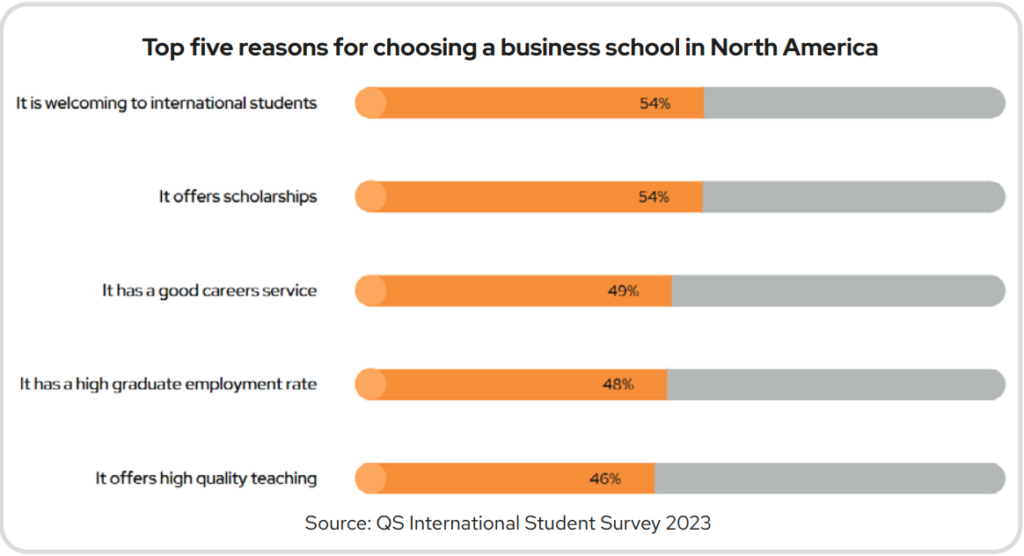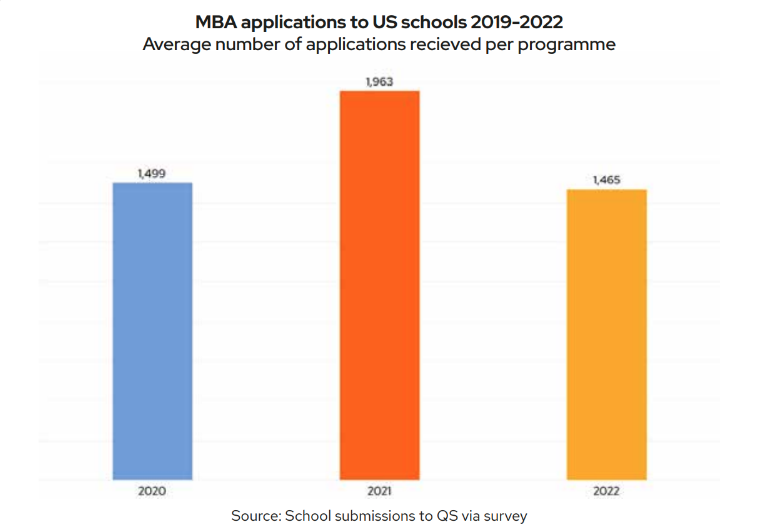
Students looking to study in North America do so because of its “welcoming environment”. That’s according to a new QS report, titled “Business school applicant trends and motivations in 2024”, we reviewed the 11,000+ responses to the QS International Student Survey we received in 2023. With a three-year total of 28,010 responses, we have a global overview of GME candidates’ preferences, with 160 nationalities represented. A significant 54% of the responses came from Generation Z individuals, born between 1997 and 2002.
What motivates GME students to study in North America?

For the applicants considering North America, the primary factors influencing their choice of business school are that it is welcoming to international students and the availability of scholarships, with 54% of respondents citing them both as crucial elements.
This emphasis on financial aid mirrors the rising cost of higher education in the region and the growing awareness among students of the long-term financial implications of student loans. The third and fourth considerations are strong career services with links to employers (49%) and high graduate employment rates (48%), reflecting the pragmatic approach of applicants. They seek tangible outcomes from their investment in education, such as job security and robust career opportunities.
“Concern about discrimination is something that often occupies my mind as an international student. It’s crucial to feel safe and accepted in a foreign academic environment.” Survey respondent from China
Notably, comparing to our analysis into why international students seek a GME degree in European business schools, we found that respondents interested in North American institutions prioritise a welcoming environment (54%) more than those in Europe (49%).
Additionally, students who choose to study in the Asia Pacific region also prioritise a welcoming environment (52%), which is higher than Europe’s response outcomes but falls behind North American institutions’ results.
Interestingly, QS found that students looking to study in North America care less about ‘high quality teaching’ (46%) than those looking to study in Asia Pacific (50%) – the second highest choice in the Asia Pacific region’s survey outcomes. This may be because students may perceive that North American institutions offer a more diverse and dynamic learning environment, with opportunities for cultural exchange and experiential learning that outweigh concerns about teaching quality.
“Because the US is famous for awarding a lot of scholarships” Quote from a survey respondent from India about why they want to study in the US
Furthermore, students considering North American institutions value scholarships more than those considering European business schools. This could be due to North American institutions better highlighting their reputation for scholarship programmes or greater availability of financial aid.
What are the application trends in North America?

In assessing the trends in applications to US full-time MBA programmes over a three-year period, there’s noticeable fluctuation, presumably linked to the COVID-19 pandemic. The 2019-2020 academic year, pre-pandemic, saw 1,499 applications. In 2020-2021, during the pandemic’s peak, applications rose to 1,963, possibly due to individuals aiming to enhance their qualifications amidst economic uncertainty or leveraging remote learning opportunities.
However, in 2021-2022, applications dropped to 1,465, potentially indicating a stabilisation as the pandemic’s immediate impact lessened, and applicants adapted to new circumstances, including changes in the job market and higher education. Early signs suggest a further decline in MBA applications, but as of the report’s publication, QS lacked sufficient data to confirm this trend.
Paul Brandano, Executive Director of the Master of Science in Business Analytics (MSBA) programme at UCLA Anderson School of Management said, “We are receiving an increasingly global array of applications, with a notable majority from China and India.” This trend highlights the growing recognition of MSBA programmes in the global educational sphere, drawing students from various regions, including Latin America, Europe, and Asia.
The broad geographical diversity in applications is not just a statistic; it plays a crucial role in enriching the learning experience. Paul also points out: “Diversity in the classroom is crucial for developing data models and analytic approaches that are globally relevant and inclusive.” This approach ensures that the curriculum and discussions in MSBA programmes incorporate diverse perspectives, preparing students for the global business arena.
Looking ahead, business schools foresee a continuous rise in the popularity of MSBA programmes. “Awareness of the value and opportunities provided by an MSBA degree is growing, attracting more applicants from diverse backgrounds”. This trend is expected to bring in students from less represented regions, further diversifying the student population.



